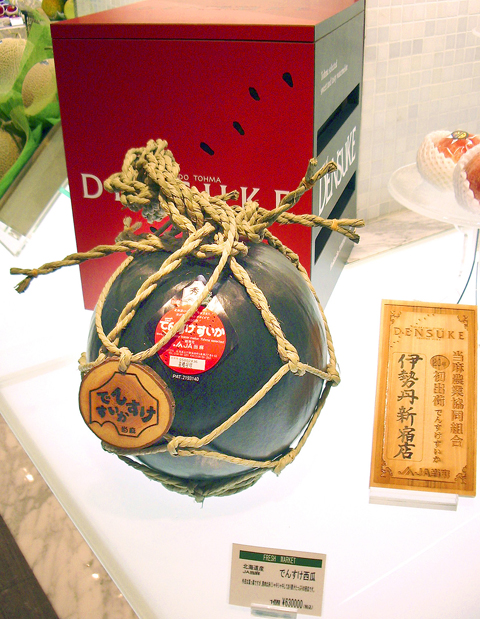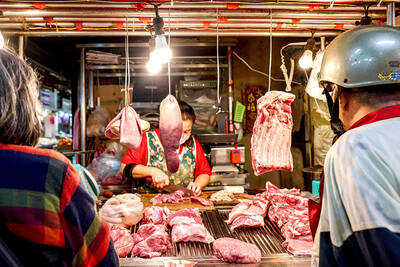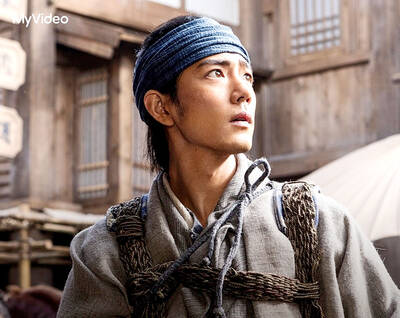A black jumbo watermelon auctioned in northern Japan fetched a record ¥650,000 (NT$188,000) earlier this month. That makes it the most expensive watermelon ever sold in the country — and possibly the world.
The eight-kilogram premium Densuke watermelon, one of only 65 from the first harvest of the season, was purchased by a marine products dealer. The fruit is grown only on the northern island of Hokkaido.
In Japan melons are a luxury item commonly given as gifts. This watermelon’s hefty price tag follows another jaw-dropping auction last month, where a pair of Yubari cantaloupe melons sold for a record ¥2.5 million (NT$722,500).

PHOTO: AP
“This is the highest price on record for a Densuke watermelon, and that probably means it’s the highest of any watermelon in Japanese history,” said Kazuyoshi Ohira, a spokesman for the Tohma Agricultural Cooperative in Hokkaido.
Growers expect to produce about 9,000 Densuke watermelons this year, Ohira said.
For seasonal, high-end fruits like the Densuke watermelon and the Yubari cantaloupes, Japanese buyers are often willing to pay top prices at auction for the prestige of owning the very first ones of the year.
Unseasonably warm weather in April and May have helped boost sugar content and overall quality, and consequently prices, of the 2008 watermelons, Ohira said.
Most Densuke watermelons will retail at department stores and supermarkets for a more modest ¥20,000 to ¥30,000 (NT$5,800 to NT$8,700), Ohira said.
And what makes a watermelon worth so much?
Its unusual black skin, Ohira said. Inside, the watermelon is crisp and hard. And, he says, it has unparalleled taste.
“It’s a watermelon, but it’s not the same,” he said. “It has a different level of sweetness.”
Jun Otsuki, a spokesman for Guinness World Records’ Tokyo office, said his organization does not keep records of any sort on watermelons.
(AP)
這個月初在日本北部,有一顆巨無霸黑皮西瓜以創紀錄的六十五萬日圓(新台幣十八萬八千元)拍賣成交,成為日本—甚至可能是全世界最貴的一顆西瓜。
買下這顆八公斤重高級「Densuke」西瓜的是一位漁產商人,這顆西瓜是當季第一批僅收成六十五顆的黑皮西瓜之一;這個品種只有在北海道才能生長。
瓜類在日本屬於奢侈的水果,多作為饋贈之用。上個月,有兩顆夕張產的哈密瓜才以破紀錄的兩百五十萬日圓(新台幣七十二萬兩千五百元)拍賣出去;接著,這顆黑皮西瓜也創下令人咋舌的拍賣天價。
北海道當麻町農業合作社的發言人大平和義(譯音)說:「這次拍賣創下『Densuke』西瓜的最高價,它還可能是日本有史以來最高價的西瓜。」
大平表示,瓜農預計今年會生產約九千顆「Densuke」西瓜。
日本買家常會為了得到首位年度奪標者的頭銜,而在拍賣會上高價競標「Densuke」西瓜和夕張哈密瓜這類季節性高檔水果。
大平說,今年四、五月反常的溫暖氣候,讓西瓜的甜度和整體品質都提升了,因此今年的價格也較高。
大平說,大部分的「Densuke」西瓜將以較合理的價格在百貨公司及超市零售,售價在兩萬到三萬日圓(新台幣五千八百元到八千七百元)間。
是什麼讓一顆西瓜如此昂貴?
大平說,因為它是罕見的黑皮西瓜,裡面的瓜瓤清脆密實;此外,它的滋味更是無與倫比。
他說:「這是一顆不一樣的西瓜,它的甜度不同於一般。」
金氏世界紀錄東京辦事處的發言人大月淳(譯音)表示,金氏世界紀錄中並沒有任何和西瓜相關的紀錄。
(美聯社�翻譯:袁星塵)

Pigs that are resistant to a deadly viral disease have been created by scientists at Edinburgh’s Roslin Institute. The gene-edited animals remained healthy when exposed to classical swine fever (CSF), a highly contagious and often fatal disease. The virus was eradicated in the UK in 1966, but there have been several outbreaks since and it continues to pose a major threat to pig farming worldwide. “Classical swine fever is a devastating disease for livestock and farmers as we saw with the outbreak in the UK, 25 years ago,” said Helen Crooke, mammalian virology deputy leader at the Animal and Plant Health Agency

Have you ever seen a circular intersection where cars continuously flow in one direction around a central island? That is a “roundabout,” a well-known alternative to traditional intersections. Drivers enter and exit at different points without relying on traffic lights. Their primary purpose is to improve traffic flow and minimize the likelihood of high-speed collisions, particularly dangerous T-bone and head-on crashes. Roundabouts have existed and been implemented for over a century. In the 1960s, the modern roundabout emerged in the UK, with added rules for yielding. Unlike intersections with red lights, roundabouts allow vehicles to continue moving at a

A: So you’re reading Jin Yong’s martial arts novel again? B: Yup, Jin’s novels are so fascinating, especially the trilogy: “Legends of the Condor Heroes,” “Return of the Condor Heroes,” and “Heaven Sword and Dragon Saber.” A: The late novelist published his first story in 1955, which means this year marks the 70th anniversary of his “wuxia” world. B: Wasn’t an English version of “Legends of the Condor Heroes” also released in 2018? A: Yes, but the debate over the translation of kung fu moves continues — like the evil move “Nine Yin Skeleton Claw.” A: 你又在重讀金庸的武俠小說啦? B:

對話 Dialogue 清清:明天我想請一天假。 Qīngqing: Míngtiān wǒ xiǎng qǐng yì tiān jià. 華華:為什麼?這個月的假已經很多了,你還要請假啊? Huáhua: Wèishénme? Zhège yuè de jià yǐjīng hěn duō le, nǐ háiyào qǐngjià a? 清清:因為明天是農曆九月初九重陽節,重陽節是老人節,我想陪我阿公阿嬤去爬山,而且家裡也要拜祖先,請假比較方便。 Qīngqing: Yīnwèi míngtiān shì nónglì jiǔ yuè chū jiǔ Chóngyáng Jié, Chóngyáng Jié shì Lǎorén Jié, wǒ xiǎng péi wǒ āgōng āma qù páshān, érqiě jiālǐ yě yào bài zǔxiān, qǐng jià bǐjiào fāngbiàn. 華華:了解,是應該陪老人出去走走。阿公阿嬤應該會拿到政府發的紅包吧? Huáhua: Liǎojiě, shì yīnggāi péi lǎorén chūqù zǒuzǒu. Āgōng āma yīnggāi huì nádào zhèngfǔ fā de hóngbāo ba? 清清:有啊!65歲以上的長輩都會領到敬老金,只是每個縣市給的數字不太一樣,年紀越大,拿到的會越多喔! Qīngqing: Yǒu a! Liùshíwǔ suì yǐshàng de zhǎngbèi dōu huì lǐngdào jìnglǎojīn, zhǐshì měi gè xiànshì gěi de shùzì bútài yíyàng, érqiě niánjì yuè dà, ná dào de huì